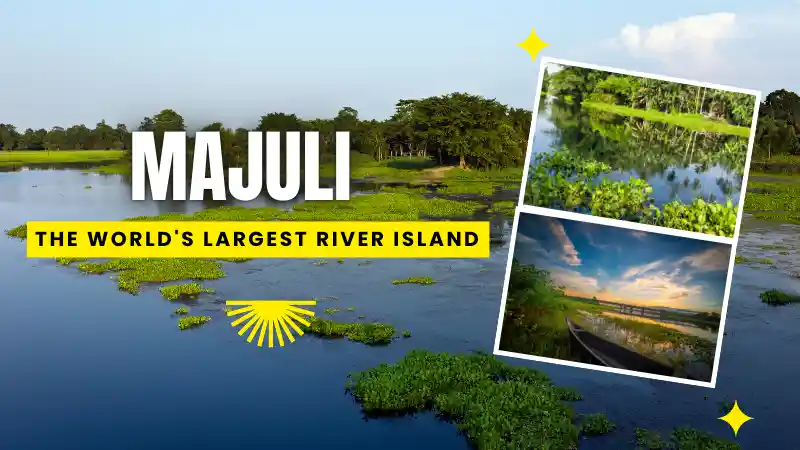Exploring Majuli: World’s Largest River Island:
Resting serenely in the heart of the Brahmaputra in Assam, Majuli Island is a truly cultural wonder worth visiting. Majuli Island is acknowledged as the largest river island throughout the world, one of the crown jewels of India’s breathtaking landscapes. Majuli island Assam gleams like a jewel in the Brahmaputra River, surrounded with lush greenery, winding waterways and shrouded skyline viewes offering a serene natural canvas. The island beats with vibrant traditions & cultures, from the Neo-Vaishnavite satras to the colorful festivals and handwoven crafts of the local people – creating a natural & cultural tapestry as rich as its landscape.
Why You Should Visit Majuli?
This UNESCO treasure is adopted as the largest river island in the world, captivating in its beauty yet threatened by severe erosion. A remarkable birdwatching destination, the island is a photographer’s paradise with its eco-tourism initiatives and rich Assamese traditions. Majuli has significantly contributed to Neo-Vaishnavism, highlighted the region historic Satra monasteries and unique religious customs. Core of Assamese Neo showcases epic symbols of Cultural Heritage Majuli offers a green photographical paradise, ideal for birdwatching.
Home to the indigenous Mishing tribe, Majuli offers unparalleled riverfront eco-tourism experience with duckboard houses, textiles and serene lifestyle. As the world’s largest river island, Majuli has adopted eco-friendly initiatives that not only protect its unique wildlife habitats and promoting sustainable tourism, but also empower local communities through sustainable livelihoods.
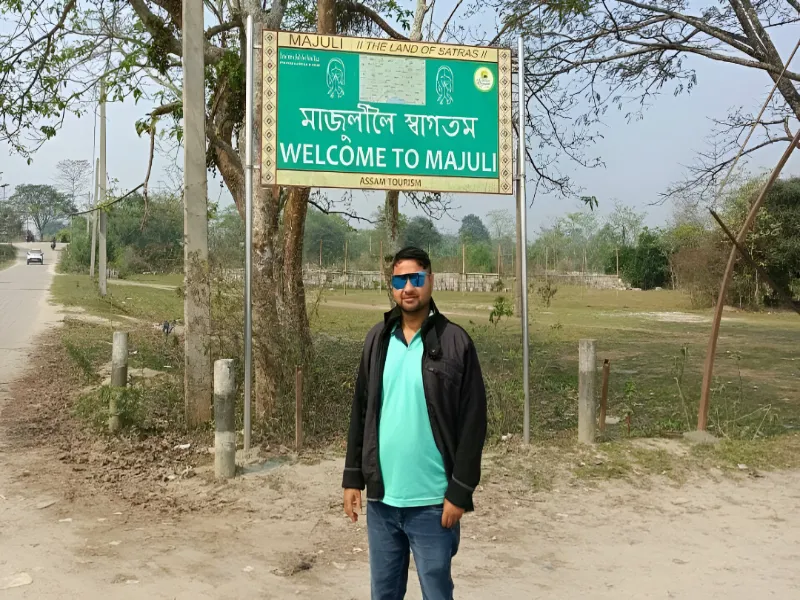
How Big is Majuli Island?
Majuli used to be bigger but, because of flooding and erosion issues, now it’s reduced in size by 70 percent (about 352 square kilometers). Despite its shrinkage, Majuli continues to lure many visitors with its lush landscapes and riverine beauty every year. The place is full of life with its original nature and captivating beauty, inviting for those looking to experience nature and a remote lifestyle.
It has endless natural elegance, a profound cultural tradition and a sense of peace that is hard to find these days. Through its Joint effort with the Brahmaputra Board, Majuli has set the standard for eco-friendly preservation – protecting the region’s wildlife habitats and promoting sustainable tourism.
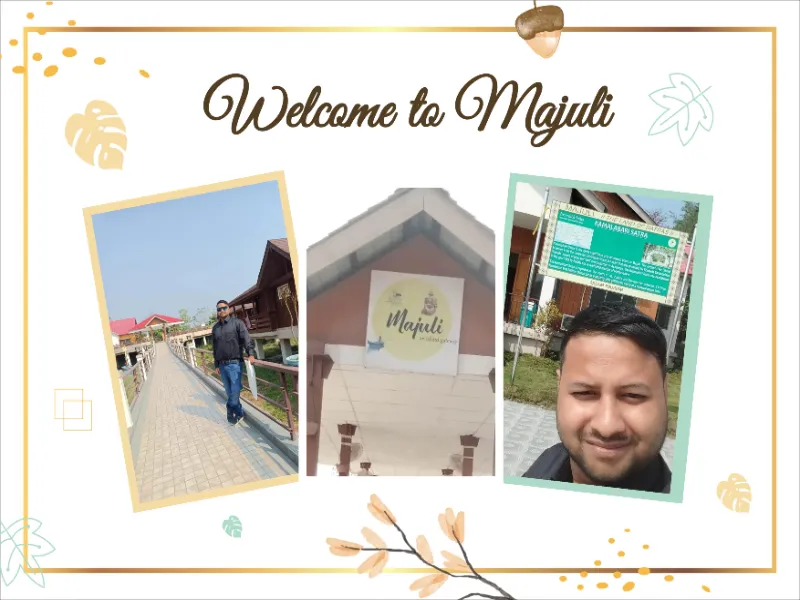
Majuli’s Festivals, Wetland Birds & Authentic Homestays:
Here’s everything you need to know about Majuli festivals, majuli island homestay, Assam’s largest River island.
- Cultural Festivals That Bring Majuli to Life:
Having a diverse culture, Majuli island celebrates various festivals that are of fundamental importance. Majuli island is famed as a culture oriented region and thus hosts numerous festivals throughout the region. The major festivals celebrated on Majuli include the following:
- Raas Festival: Celebrated as Raas Mahotsav, this age-old festival blends devotion and heritage, beautifully portraying tales from Lord Krishna’s life
- Ali-Aye-Ligang: Ali-Aye-Ligang is celebrated by the Mishing tribe which marks tribal festivity having a song and dance culture while enjoying a shared feast.
- Bihu: Other Famous Festivals such as Bihu celebrated in the land of Assam showcases an array of unique dances and cultural events.
- Majuli’s Natural Beauty and Biodiversity
The Majuli Island Assam offers an excellent spot for birdwatching enthusiasts to enjoy nature’s lap. During the migratory season millions of pelicans, storks and cranes visit the wetlands. Majuli’s fame does not end with Birdwatching, it’s also recognized for its eco-tourism ventures.
The island can be best explored through boat rides, bicycle rides or long walks through the villages in Majuli. Nature tour enthusiasts would fall in love with Majuli as it is surrounded with wetlands, riverine forests and grasslands, teeming with a variety of plants and animals.
- Birdwatching in Majuli:
Winter reignites footfall on the island with migratory birds, drawing in birdwatching enthusiasts from all around the world. Some commonly spotted birds include:
- Siberian Cranes (rarely).
- Whistling Teals.
- Greater Adjutant Stork.
- Ruddy Shelducks.
- Pelicans.
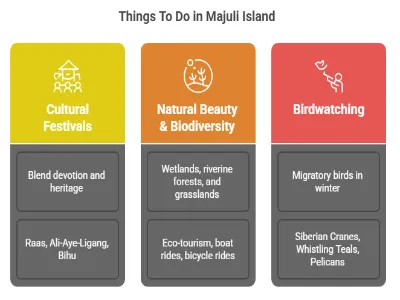
How to Plan a Trip to Majuli
People from across India can access Majuli River Island through air, rail, road and ferry services.
- By Air: The nearest airport is Jorhat Airport and has flights coming in from Kolkata, Guwahati and Delhi. After landing, tourists can take a taxi or a bus to Nimati Ghat.
- By Train: Jorhat Town Railway Station is the closest to the Majuli and is well connected with most major places in Assam. Once you get off the train, taxis and bus services to Nimati Ghat are easily available.
- By Road: Jorhat is accessible by road from Guwahati, Dibrugarh and numerous other towns in Assam. Public and private buses, taxis and other means of transportation are abundantly available.
- By ferry: Ferries from Nimati Ghat to Kamalabari Ghat , the main entry point to Majuli Island, run regularly.
The scenic ferry ride of majuli island Assam lasts about an hour, passing through the majestic Brahmaputra river, providing beautiful views. Other than that, tourists can rent private country boats for a unique customized experience.
| Ferry Route | First Ferry | Last Ferry |
| Nimati Ghat (Jorhat) to Kamalabari Ghat (Majuli) | 8:30 AM | 4:00 PM |
| Kamalabari Ghat (Majuli) to Nimati Ghat (Jorhat) | 7:30 AM | 3:15 PM |
Online Booking:
You can book tickets online via: Online Ferry Ticket Booking Services
Best Places to Explore In Majuli:
Majuli holds a significant role in the Neo-Vaishnavism faith, a reformed Hindu devotional movement guided by Sri Sri Srimanta Sankardeva in the 15th century. There are many Satras (monasteries) scattered across the island, conserving and encouraging rituals, classical dance forms, musicians and drama artists. Travelers can witness the traditional Bhaona, an age-old mythological narrative dance drama.
Majuli island Assam is complete with deep-rooted cultural, spiritual and natural features. There are some of the highly recommended places to visit in Majuli are:
- Explore the Satras – Discover Assamese religious traditions and performing arts.
- Birdwatching – Go to wetlands for the rare migratory birds.
- Bicycle tours – Cycling through villages and paddy fields.
- Cultural immersion– Experiencing Mishing tribal life by living with them in their homestay.
- Dekasang Majuli – A Famous Resort for genuine Assamese hospitality.
- Pottery villages – Majuli is home to Pottery villages that are famous for their unique handmade pottery which is crafted without a potter’s wheel
- Traditional Dishes – Bamboo shoot delicacies, fish tenga, pitha and other local dishes can be found at the traditional restaurants in Majuli.
Where to stay In Majuli Island Assam?
Majuli offers a range of charming and eco-friendly stays that reflect the island’s peaceful lifestyle and vibrant culture. From bamboo cottages to boutique resorts, each property provides a unique way to experience Assam’s riverine beauty. Whether you’re seeking a homestay in a traditional Mishing village or a resort with modern comforts, there’s something here for every kind of traveler.
- La Maison de Ananda – Bamboo cottages on stilts for an authentic village experience.
- Risong Family Guest House – Homely atmosphere with traditional Assamese food.
- Ygdrasill Bamboo Cottage – Pond-side eco-lodge offering affordable stays.
- Dekasang Majuli – A boutique resort offering modern comforts with river views.
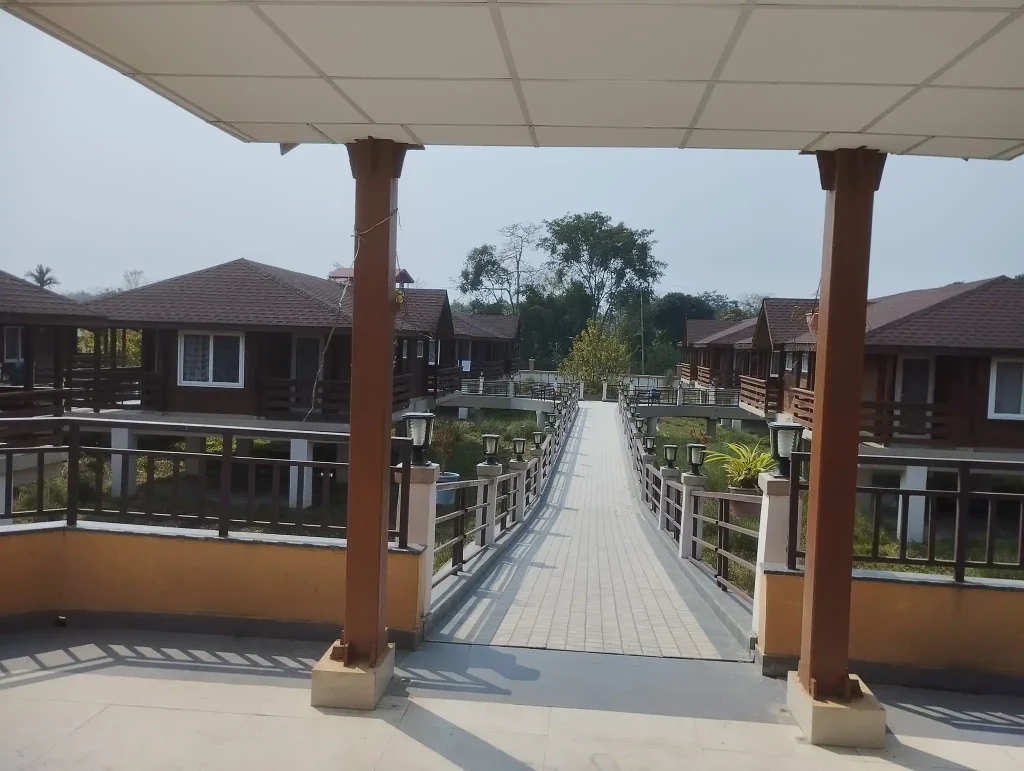
Responsible tourism in Majuli:
Majuli encourages eco-friendly tourism, where visitors are asked to respect culture, customs and local traditions. In order to ensure sustainable travel:
- Avoid plastic waste
- Support local artisans (buy handmade crafts)
- Respect cultural norms & traditions
You may also like: Kamakhya Temple Guwahati.
Majuli Island Assam Travel Checklist ✅
Essential Documents:
✔️ Valid ID proof (Aadhar, Passport, or Driving License)
✔️ Printed/digital copies of hotel & transport bookings
✔️ Permits (if required for foreign tourists)
Clothing & Accessories:
✔️ Comfortable cotton clothes (hot & humid climate)
✔️ Light jacket (for cooler evenings)
✔️ Sunglasses, hat/cap & sunscreen
✔️ Comfortable walking shoes/sandals
✔️ Raincoat/umbrella (especially during monsoon)
Travel Essentials:
✔️ Life jacket (safety for ferry travel)
✔️ Power bank & phone charger
✔️ Camera & extra memory cards
✔️ Flashlight/torch (for rural areas)
✔️ Water bottle (stay hydrated)
✔️ Snacks & dry fruits
Health & Safety:
✔️ Basic medicines & first-aid kit
✔️ Mosquito repellent
✔️ Hand sanitizer & wet wipes
Local Exploration:
✔️ Bicycle (rent one to explore the island)
✔️ Binoculars (for birdwatching)
✔️ Notepad/journal (to document your trip)
Final Thoughts:
Majuli stands out as an exquisite cultural and natural gem. The island serves as the perfect getaway for anyone looking to explore Assam’s rich heritage, spirituality and stunning views. Travelers seeking adventure, history, or nature will find themselves captivated in Majuli. Heavily consider making plans to Majuli and marvel at this untouched beauty residing in Northeast India.
(FAQs) about Majuli Island:
1. What makes Majuli Island Assam special?
Majuli Island, the largest river island in the world, is situated on the Brahmaputra river in Assam. It is mainly famous for its neopisceal monasteries choker satras where a tradition for a good outcome influenced and also for its colourful tribes, for handmade potteries and tapestries.
2. How large is Majuli Island currently?
Over the years, Majuli has lost considerable area due to constant river erosion and flooding. Its area has decreased by 70% and it now covers approximately 350 square kilometers, but it is still the largest river island in the world.
3. How can I get to Majuli Island?
Travelers typically arrive at Majuli by first getting to Jorhat, Assam, by air, rail or road. A ferry ride from Nimati Ghat to Kamalabari Ghat on Majuli takes about one to two hours from Jorhat. For a more intimate experience, there are private boats as well.
4. When is the best time to visit Majuli?
The best time to visit is between October and March when the weather is pleasant and dry. This season also coincides with several cultural festivals and arrival of migratory birds, making it an ideal time for sightseeing and birdwatching.
5. What are the key attractions on Majuli Island?
Majuli Island Assam offers a vibrant cultural journey, with must-see spots like historic Satras, like Kamalabari and Auniati, which feature Assamese spiritual art and performances. The bustling tribal villages of the Mishing community, pottery villages known for wheel-less pottery and the island’s wetlands, a haven for bird-watchers.
6. Are there accommodation options on the island?
Yes, there are eco-friendly cottages, homestays with local families and simple guesthouses. Reservations are advised, especially during festival seasons and will ensure comfortable lodgings.
7. What cultural experiences can tourists expect?
From watching traditional dance-drama like Bhaona, celebrating festivals like Raas Leela and Ali-Aye-Ligang, to exploring native crafts and food. Spending time with tribal families on Majuli Island gives you a authentic experience into their day-to-day life and age-old traditions – a moment that truly enriches Majuli Island Assam.
8. Is Majuli suitable for nature lovers and birdwatchers?
Absolutely. The island’s wetlands draw many migratory birds such as the Siberian crane and greater adjutant stork, making it a prime spot for birdwatching and ecological tourism.
9. What should visitors keep in mind to promote responsible tourism?
Visitors are advised to respect local customs, limit plastic waste, support local artisans by purchasing handmade crafts, dress modestly when visiting religious sites and choose environmentally gentle travel choices to help protect Majuli’s delicate ecosystem.
10. What activities can I do on Majuli besides sightseeing?
In addition to visiting places of cultural interest, tourists can cycle in the beautiful villages and paddy fields, ride a boat on the Brahmaputra, attend workshops on pottery and mask-making and try traditional Assamese food such as bamboo shoot dishes and fish tenga.

